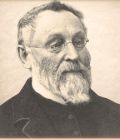Offensive, excoriating lochia (Kreosotum) (G.).
Lancinating pains from the uterus to the umbilicus (A.).
Sharp, clutching pains (in the uterus), as if clutches with a hand (C.).
Troublesome and severe itching of the vulva, with pimples all around (G.).
MENSES TOO LATE AND TOO SCANTY; OR TOO EARLY AND TOO PROFUSE (K.).
Aching and dull pain in the lumbar and sacral regions, extending to thighs and legs (N.).
Pain in the back and small of back, particularly with Stiffness, improved by walking (N.).
Intense burning and cutting pain when urinating (Cantharis) (Bt.).
URINE THICK, SLIMY, VERY OFFENSIVE, DEPOSITING A YELLOW OR PASTY SEDIMENT, WHICH SOMETIMES ADHERES TO THE VESSEL LIKE BURNT CLAY (N.).
CHILD ALWAYS WETS THE BED DURING THE FIRST SLEEP (Benz-Ac., Causticum, Cina, Kreosotum, Acid phosphoricum.) (N.).
Irritable bladder (Apis, Belladonna, Cantharis, Nux vomica, Pulsatilla) (D.).
Red sediment in the urine (Lycopodium), which is acid and fetid (D.).
Weakness of sexual organs (Caladium, Digitalis, Gelsemium, Phosphorus) (D.).
Discharge of prostatic juice (Natrum muriaticum, Nux vomica, Acid phosphoricum., Selenium, Sulphur) (G.).
Nocturnal pollutions (Dioscorea, Gelsemium, Nux vomica, Acid phosphoricum.) (G.).
GLEET, WITH SCANTY DISCHARGE IN THE MORNING ONLY (D.).
MEATUS GLUED TOGETHER IN THE MORNING (Cantharis, Phosphorus, Thuja) (A.).
Painless, yellowish, gleety discharge, staining the linen; obstinate gonorrhoea, of long standing (A.).
AGGRAVATION:
During and right after eating; in the forenoon; in the afternoon; in the evening; when sitting quietly; from standing; from mental labour; from sexual excesses; from jar; after sleep; from laundry work; from milk; during climacteric; while kneeling at church; in the cold air; and before a thunder- storm.
AMELIORATION:
From external heat; from violent exertions; from sitting with legs crossed; from loosening clothes; in open air; and from warmth of bed.
RELATIONSHIP:
It ANTIDOTES mental effects of overuse of tobacco in patients of sedentary habits, who suffer from overmental exertion.
Complementary : Natrum muriaticum
Frequently indicated after Nux vomica, Silicea and Sulph.
Similar to: Lachesis, Sanguinaria, and Until., in climacteric irregularities of the circulation.
Inimical to: Lachesis (should not be used before or after), and Pulsatilla (with which it should never be alternated.).

